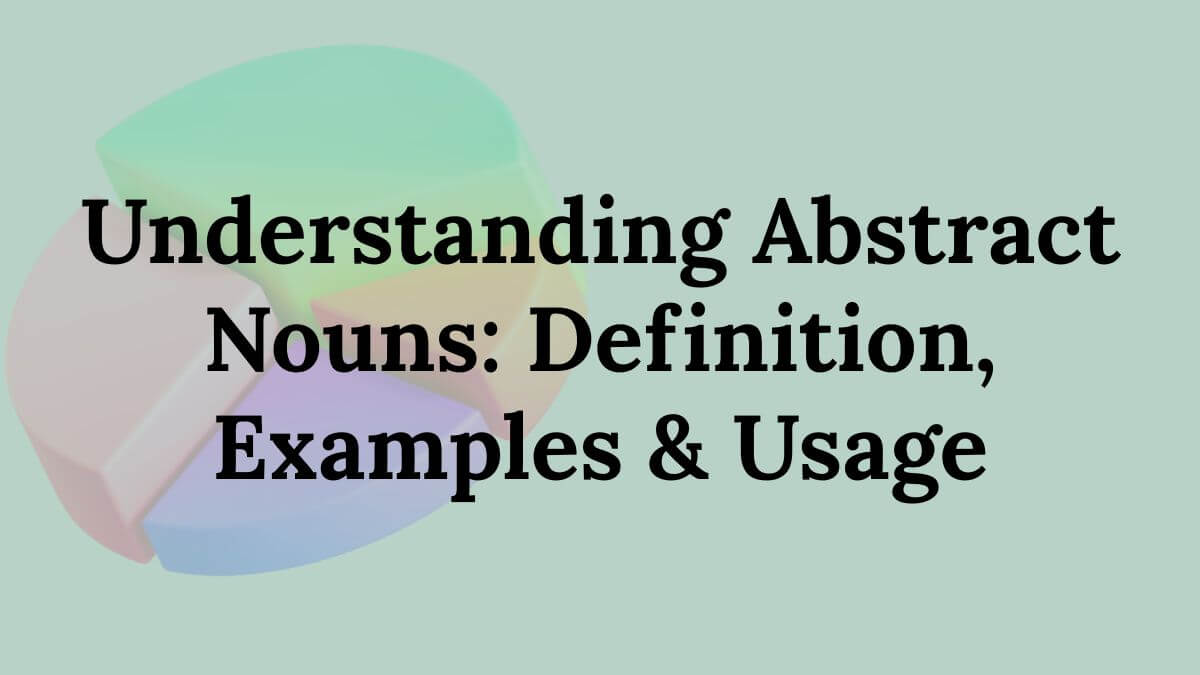Words are the invisible threads that stitch thoughts into meaning. This guide explains their meaning, examples, and how to use them correctly.
Introduction
Understanding abstract nouns is a key step for anyone learning English. Unlike concrete nouns, which name things we can see or touch, abstract nouns represent ideas, qualities, or states that are intangible. This blog post will guide you through the definition, examples, and usage of abstract nouns, helping you to improve your grammar skills with clear explanations and practical tips. Understanding Abstract Nouns
What Are Abstract Nouns?
Definition of Abstract Nouns
Abstract nouns describe things that aren’t visible or tangible—such as emotions, ideas, or traits. Unlike physical objects, they can’t be seen or touched. Words like love, freedom, happiness, and courage are abstract nouns because, although you can’t physically interact with them, you can experience or understand them. Understanding Abstract Nouns
How Abstract Nouns Differ from Concrete Nouns
While concrete nouns name people, places, or things that you can observe directly, abstract nouns refer to intangible concepts. For instance:
- Concrete noun: apple (you can see and touch it)
- Abstract noun: knowledge (you cannot touch it, but you can have it)
Understanding abstract nouns allows learners to express complex ideas and emotions clearly.
Examples of Abstract Nouns
Common Abstract Nouns and Their Meanings
Here are some examples of abstract nouns along with their meanings to help you get familiar with them: Understanding Abstract Nouns
Abstract Noun |
Meaning |
| Love | A deep feeling of affection |
| Courage | The ability to face fear |
| Freedom | The power to act or think freely |
| Happiness | A state of being happy |
| Honesty | Truthfulness and integrity |
| Knowledge | Information and skills acquired |
| Justice | Fairness and lawfulness |
| Friendship | The bond between friends |
| Anger | A strong feeling of displeasure |
| Wisdom | The ability to make good decisions |
Using Abstract Nouns in Sentences
- Her courage inspired everyone during the crisis.
- They fought for their freedom from oppression.
- Happiness cannot be bought with money.
A true friend is someone who values honesty as a key part of their character. Understanding Abstract Nouns
How to Identify Abstract Nouns
Tips for Spotting Abstract Nouns
- Ask if it’s something you can see, touch, hear, smell, or taste.
If the answer is no, it’s likely an abstract noun. - Check if it refers to a feeling, quality, or idea.
Words like beauty, fear, and education fit this category. - Look for nouns that often follow adjectives.
For example, greatness, sadness, or brightness.
Abstract Noun Forms
Many abstract nouns are formed by adding suffixes like -ness, -tion, -ity, and -ment to adjectives or verbs:
Root Word |
Abstract Noun Form |
| Happy | Happiness |
| Create | Creation |
| Possible | Possibility |
| Agree | Agreement |
Usage of Abstract Nouns in English Grammar
Abstract Nouns as Subjects and Objects
- Abstract nouns can serve as either the subject or the object in a sentence, depending on how they’re used.
- Subject: Freedom is important to everyone.
- Object: She values honesty above all.
Abstract Nouns with Articles and Quantifiers
Abstract nouns are usually uncountable, so they do not take indefinite articles (a or an). Instead, use quantifiers like some, much, or a lot of: Understanding Abstract Nouns
- Correct: She has much patience.
- Incorrect: She has a patience.
Making Abstract Nouns Plural
Some abstract nouns can have plural forms when referring to types or instances:
- The wisdom of different cultures vary.
- Different experiences shape who we are.
Common Mistakes with Abstract Nouns and How to Avoid Them
Using Articles Incorrectly
- Incorrect: He has a courage.
- Correct: He has courage.
Confusing Abstract Nouns with Adjectives or Verbs
Sometimes learners mistake abstract nouns for adjectives or verbs. Focus on the role of the word in the sentence:
- Kindness is a noun (the quality of being kind).
- Kind is an adjective (describes a noun).
- To kind is not a verb.
Why Understanding Abstract Nouns Matters
Enhances Your Expression of Ideas
Knowing abstract nouns enriches your vocabulary, allowing you to express complex feelings and concepts clearly.
Improves Writing and Speaking Skills
Using abstract nouns appropriately makes your English sound more natural and sophisticated.
Read More:
Beginner to Advanced noun: The Journey Through Nouns
10 Simple English Dialogues for Beginners: Grow Your Speaking Skills
Conclusion
Understanding abstract nouns is fundamental for mastering English grammar. These nouns allow us to communicate thoughts, feelings, and ideas that go beyond the physical world. By learning their definitions, recognizing common examples, and practicing their usage, English learners can improve both their writing and speaking skills effectively. Keep practicing and incorporating abstract nouns into your sentences to become more confident and fluent. Remember, your journey to mastering English grammar is easier with a solid grasp of abstract nouns.Understanding Abstract Nouns
